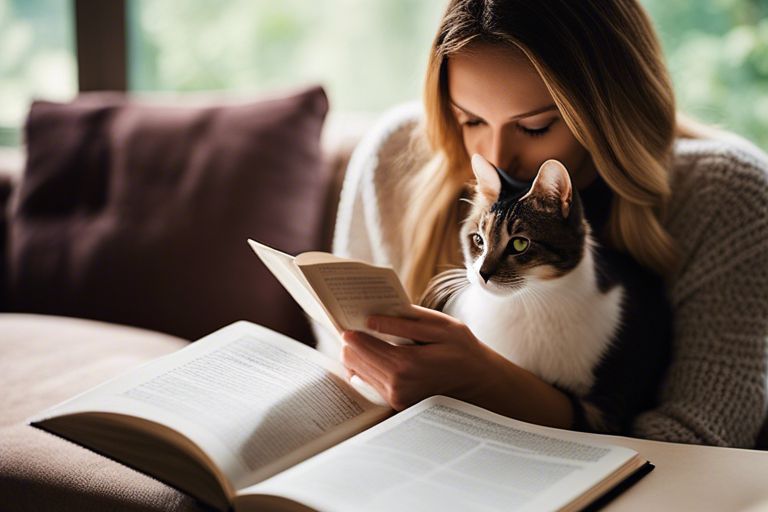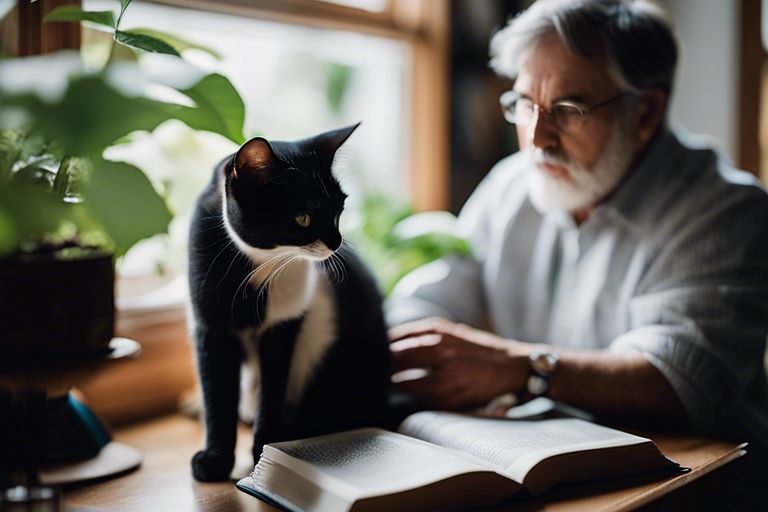Are you concerned about your feline friend experiencing difficulty with bowel movements? Constipation in cats can be a frustrating and uncomfortable experience for both you and your pet. Causes of constipation in cats can range from dietary issues, lack of exercise, dehydration, and even underlying health conditions. It’s important to stay aware of the signs, such as reduced frequency of bowel movements or straining in the litter box, as these can lead to more serious problems if left untreated. However, there are several ways you can help your cat overcome constipation, from adjusting their diet to increasing water intake and providing more opportunities for exercise. In this post, we will explore the common causes of constipation in cats and offer practical solutions to alleviate your feline companion’s discomfort.
Key Takeaways:
- Diet: A diet low in fiber or lacking in moisture can contribute to constipation in cats. Ensure your cat’s diet includes plenty of water and fiber from sources such as wet food or a high-quality dry food.
- Dehydration: Cats who are not drinking enough water can become dehydrated, leading to constipation. Encourage your cat to drink more by providing fresh water, using a pet fountain, or adding wet food to their diet.
- Lack of exercise: Inactive cats may experience constipation due to a lack of physical activity. Encourage play and provide opportunities for exercise to keep your cat’s digestive system healthy.
- Medical conditions: Underlying medical issues, such as digestive problems or obstructions, can also cause constipation in cats. If your cat continues to experience constipation despite changes in diet and activity, consult with your veterinarian to rule out any underlying health concerns.
- Constipation relief: To help relieve constipation in your cat, consider adding a natural laxative or cat-specific remedy to their diet, or talk to your vet about possible medication options. It’s important to consult with a professional before trying any treatment methods on your own.
Identifying Constipation in Cats
Assuming you are concerned about your cat’s bowel movements, it is important to be able to identify the signs of constipation. Constipation in cats can be caused by various factors, such as diet, dehydration, medication, or an underlying medical condition. It is essential to recognize the symptoms and take appropriate action to alleviate your cat’s discomfort.
Symptoms of Constipation
When your cat is constipated, you may notice straining or difficulty when they try to defecate. You may also observe that your cat has decreased or absent bowel movements and is passing small, hard, dry stools. Additionally, your cat may exhibit signs of abdominal discomfort, loss of appetite, or lethargy. If you notice any of these symptoms in your cat, it is important to address the issue promptly to prevent further complications.
When to Consult a Veterinarian
If you notice that your cat is experiencing constipation and the symptoms do not improve with home remedies, or if the condition worsens, it is crucial to seek veterinary care. Your vet can perform a thorough examination to determine the underlying cause of constipation and recommend an appropriate treatment plan. Additionally, if your cat is showing signs of severe distress, such as vomiting, bloating, or straining without producing any stool, it is essential to consult a veterinarian immediately. Ignoring the signs of constipation can lead to more serious health issues in your cat, so do not hesitate to reach out for professional help when needed.
Causes of Constipation in Cats
Clearly, there are several factors that can contribute to constipation in cats. Understanding these causes can help you determine the best course of action to alleviate your feline friend’s discomfort.
Dietary Factors
Your cat’s diet plays a crucial role in their digestive health. A lack of fiber in their diet can lead to constipation, as fiber helps to keep stool soft and moving through the digestive tract. Additionally, not drinking enough water can exacerbate constipation. To prevent this, make sure your cat’s diet includes a healthy balance of fiber, such as in high-quality cat food and the proper amount of water consumption. Assume that increasing fiber and water intake in your cat’s diet can help alleviate constipation.
Hydration and Water Intake
Hydration plays a crucial role in your cat’s overall health, including their digestive system. Insufficient water intake can lead to dehydration, making it harder for your cat to pass stools. Factors such as hot weather, lack of access to clean water, or underlying health issues can contribute to low water intake in cats. If you notice your cat is not drinking enough water, consider incorporating wet food into their diet to help them stay hydrated and prevent constipation.
Physical Activity and Obesity
Physical activity is essential for maintaining your cat’s digestive health. Obesity can lead to a sedentary lifestyle, which in turn can contribute to constipation. Regular exercise and play can help keep your cat’s digestive system functioning properly. Additionally, maintaining a healthy weight can reduce the risk of constipation and other digestive issues in your cat.
Underlying Health Issues
There are several underlying health conditions that can contribute to constipation in cats. Conditions such as arthritis, pelvic injuries, or neurological issues can make it difficult for cats to posture properly to defecate. Additionally, digestive disorders or obstructions in the digestive tract can cause constipation. If you suspect that your cat’s constipation is caused by an underlying health issue, it’s important to consult with your veterinarian for proper diagnosis and treatment.
Medication Side Effects
Some medications can have side effects that affect your cat’s digestive system, leading to constipation. Pain medications, antihistamines, or certain antibiotics can cause constipation as a side effect. If your cat is on medication and experiencing constipation, consult your veterinarian to discuss potential alternatives or solutions.

Treating and Managing Constipation
Despite your best efforts, your cat may still experience constipation. In such cases, there are several options available to help your cat find relief. A great resource to consider is 6 Ways to Help Your Constipated Cat, which offers additional tips for managing this condition.
Home Remedies and Lifestyle Changes
If your cat is experiencing mild constipation, there are several home remedies and lifestyle changes you can implement to help alleviate the issue. These may include increasing your cat’s water intake, adding fiber to their diet, and providing regular exercise to encourage bowel movements. Additionally, ensuring your cat has access to a clean and comfortable litter box can also help alleviate constipation.
Over-the-Counter Solutions and Supplements
For moderate cases of constipation, over-the-counter solutions and supplements may be recommended by your veterinarian. These can include cat-specific laxatives, stool softeners, or fiber supplements to help promote regular bowel movements. It’s important to consult with your veterinarian before giving your cat any over-the-counter medications to ensure they are safe and appropriate for your pet.
Prescription Medications and Veterinary Procedures
In severe cases of constipation, your veterinarian may prescribe medications or recommend veterinary procedures to help relieve your cat’s symptoms. These may include prescription-strength laxatives, enemas, or manual extraction of fecal matter. Your veterinarian will assess your cat’s condition and provide appropriate treatment options based on their specific needs.
When Surgery May Be Necessary
In rare and extreme cases, surgery may be necessary to address severe or chronic constipation in cats. This may involve removing impacted fecal matter or addressing underlying medical conditions contributing to the constipation. Surgery should be considered as a last resort and will be recommended by your veterinarian only if deemed absolutely necessary for your cat’s well-being.
By addressing your cat’s constipation with a combination of home remedies, over-the-counter solutions, prescription medications, and veterinary interventions, you can help alleviate discomfort and restore regular bowel function. If you notice any persistent or worsening constipation in your cat, ensure to consult with your veterinarian for timely and effective intervention.
Prevention Strategies
Unlike treatment, focusing on prevention of constipation in your cat is the best approach to ensuring their ongoing digestive health. By implementing a few simple strategies, you can reduce the risk of constipation and promote regular, healthy bowel movements. Here are some key prevention strategies you can implement to support your cat’s digestive health.
Optimal Diet for Digestive Health
When it comes to preventing constipation in your cat, a crucial factor is their diet. Ensuring that your cat’s diet is high in fiber is essential for maintaining regular bowel movements. High-fiber foods, such as quality commercial cat foods or a veterinarian-recommended high-fiber diet, can help promote healthy digestion and prevent constipation in your cat. Additionally, it’s important to ensure your cat has access to plenty of fresh water to aid in digestion and prevent dehydration, which can contribute to constipation.
The Role of Regular Exercise and Enrichment
Regular exercise and mental stimulation play a significant role in your cat’s overall health, including their digestive system. Encouraging physical activity can help keep your cat’s digestive system functioning properly by promoting regular bowel movements. Providing environmental enrichment through interactive toys, scratching posts, and opportunities for exploration can help reduce stress and anxiety, which can also contribute to digestive issues. By providing opportunities for your cat to engage in regular physical activity and mental stimulation, you can help prevent constipation and support their overall well-being.
How can I help my constipated cat?
Following this informational guide, you now have a better understanding of the potential causes of constipation in cats, including diet, dehydration, and medical conditions. By incorporating high-fiber foods, increasing water intake, and providing regular exercise, you can help regulate your cat’s digestive system and alleviate constipation. Additionally, it’s crucial to seek veterinary care if your cat experiences prolonged or severe constipation, as underlying health issues may require medical intervention. By being proactive and attentive to your cat’s needs, you can effectively support their digestive health and overall well-being.
FAQ
Q: What causes constipation in cats?
A: Constipation in cats can be caused by a variety of factors including dehydration, lack of fiber in their diet, hairballs, and certain medical conditions such as pelvic injuries, tumors, or neurological disorders affecting the bowel.
Q: How can I help relieve my cat’s constipation?
A: If your cat is experiencing constipation, you can help relieve their symptoms by increasing their water intake, feeding them a diet high in fiber, incorporating canned pumpkin or a small amount of olive oil into their diet, or using hairball remedies to help move ingested hair through the digestive tract.
Q: When should I seek veterinary help for my cat’s constipation?
A: If your cat is experiencing ongoing or severe constipation, is showing signs of distress, such as straining in the litter box, vomiting, or loss of appetite, it is important to seek veterinary help. Your veterinarian can identify the underlying cause of the constipation and provide appropriate treatment, which may include prescription medications, enemas, or dietary changes.

Jayley, a devoted cat enthusiast, also writer for other cat blog as well. She aims to dedicated to providing comprehensive information, insights, and advice on everything you’d ever want to know about our whiskered companions.
